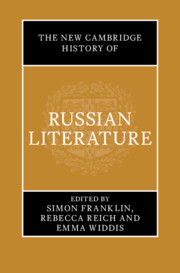Book contents
- The New Cambridge History of Russian Literature
- The New Cambridge History of Russian Literature
- Copyright page
- Contents
- Figures
- Contributors
- Acknowledgements
- On Transliteration, Names, and Dates
- Introduction
- History 1 Movements
- History 2 Mechanisms
- History 3 Forms
- 3.1 Forms before Genres
- 3.2 Folk Genres
- 3.3 Verse I
- 3.4 Drama I
- 3.5 The Novel I
- 3.6 The Short Story
- 3.7 Drama II
- 3.8 Verse II
- 3.9 The Novel II
- 3.10 Self-Writing
- 3.11 (Plat)forms after Genres
- Boxes 5 Critical Frames
- Boxes 6 Literature beyond Literature
- History 4 Heroes
- Index
- References
3.6 - The Short Story
from History 3 - Forms
Published online by Cambridge University Press: 31 December 2024
- The New Cambridge History of Russian Literature
- The New Cambridge History of Russian Literature
- Copyright page
- Contents
- Figures
- Contributors
- Acknowledgements
- On Transliteration, Names, and Dates
- Introduction
- History 1 Movements
- History 2 Mechanisms
- History 3 Forms
- 3.1 Forms before Genres
- 3.2 Folk Genres
- 3.3 Verse I
- 3.4 Drama I
- 3.5 The Novel I
- 3.6 The Short Story
- 3.7 Drama II
- 3.8 Verse II
- 3.9 The Novel II
- 3.10 Self-Writing
- 3.11 (Plat)forms after Genres
- Boxes 5 Critical Frames
- Boxes 6 Literature beyond Literature
- History 4 Heroes
- Index
- References
Summary
This chapter argues that the brevity and inherent orality of the Russian short story allows for the introduction of new, often stigmatised subject matter and for experimentation with form and language. The short story laid the groundwork for the novel, but not by providing shorter pieces to be assembled into a more complex plot. Rather, its role was to work out innovative aesthetic and thematic models that the novel would later carry into the cultural mainstream. For this reason, the short story often came to the fore during periods of literary and ideological change. The chapter presents the evolution of the Russian short story in the nineteenth and twentieth centuries, with particular attention to Anton Chekhov, the author who finalised the shift to what we now recognise as the typical concerns of the modern short story.
Keywords
- Type
- Chapter
- Information
- The New Cambridge History of Russian Literature , pp. 553 - 569Publisher: Cambridge University PressPrint publication year: 2024

